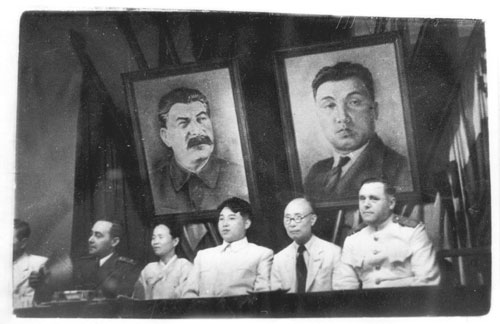Analysis
The roots of Russia-North Korea friendship go back to the ‘socialist camp’
From the first meeting between Kim Il Sung and Stalin in 1949 to the 2014 economic agreement, the two countries have had a deep diplomatic relationship.

The relations between the Democratic People’s Republic of North Korea and Russia have deep roots in history, as can be seen by the complex history of diplomatic relations between the two countries. The relationship took place primarily within the context of the “Socialist camp,” a notion which predates the birth of the Asian country in 1945. The founder of the DPRK, Kim Il Sung—the grandfather of the current leader Kim Jong-un—headed for Soviet territory after escaping the from the persecution of the Japanese army that occupied the Korean peninsula in the ‘30s. Together with other North Korean partisans, he joined the 88th International Riflemen brigade of the Soviet Army on the Far Eastern front.
In 1945, after the liberation of Korea, Kim Il Sung returned home on an armored train, with the assistance of the Soviet army. Before Mao’s ultimate victory in China, Kim’s main ally was the USSR, which was the first state to officially recognize the DPRK in 1948. The Soviet Union was also the most generous country in terms of providing material support for the fledgling Communist state in 1950, during the war with the US and South Korea, at a time when China had just emerged from a decades-long internal war and could not do much to support the war effort.
Kim Il Sung’s first trip to the USSR took place in 1949. On that occasion, Stalin gifted the Korean leader the armored train still in use today. According to recently published data from the Soviet archives, negotiations were held in Moscow on September 4, 1952 between Joseph Stalin, Kim Il Sung and the head of the Chinese military, Peng Dehuai. The parties discussed the provision of military and economic support to North Korea.
In the summer of 1956, Kim Il Sung went on a tour of the USSR, Eastern Europe and Mongolia. On June 4 and 5, he was in Moscow, where he met with Nikita Khrushchev. However, the negotiations for greater Soviet economic assistance to North Korea ended in failure, as Khrushchev criticized the manifestations of “Stalinism” and “Kim Il Sung’s cult of personality” and advised him to “take appropriate measures” to remedy the situation. Later on, when the relations between China and the USSR deteriorated and turned into an ideological war for control of the international Communist movement, Kim Il Sung surprised by adopting a neutral stance.
During his visit to Moscow in July 1961, Kim and Leonid Brezhnev signed a Treaty of Friendship, Cooperation and Mutual Assistance, which, among other provisions, included military support for North Korea by the USSR in case of armed conflict.
In 1966 and 1968, two secret meetings took place between Kim Il Sung and Brezhnev in the Soviet Union (the first taking place on the missile cruiser Varyag). In the ‘70s, the active development of North Korea’s nuclear program began, with the direct assistance of the USSR and China.
There was only one further visit by Kim to the USSR, between 16-27 May 1984, during a tour of the Socialist countries (neither country offered any official explanations regarding the reasons for the long period without any visits by the North Korean leader to the USSR). During this visit, Kim Il Sung made a deal with Konstantin Chernienko, the then-Secretary General of the CPSU, regarding the construction of a nuclear power plant with Soviet technical assistance. However, the project was never actually implemented due to the collapse of the USSR.
The USSR was the largest trading partner of the DPRK: in 1990, 53.3% of North Korea’s foreign trade was with Moscow, and the total volume of trade between the two countries stood at $2.2 billion.
After the collapse of the USSR and the coming to power of Boris Yeltsin, there were much fewer contacts between Russia and North Korea. However, after the rise to power of Vladimir Putin, deals were struck between the two countries to intensify political contacts and restore economic cooperation.
On May 5, 2014, an agreement was signed that canceled all North Koreans debts owed to Russia (worth over $11 billion). For its part, North Korea has returned this “gesture of friendship” by recognizing Russia’s annexation of Crimea.
Originally published at https://ilmanifesto.it/pyongyang-e-mosca-un-intreccio-di-relazioni-che-rimanda-ai-fantasmi-del-campo-socialista/ on 2019-04-26
